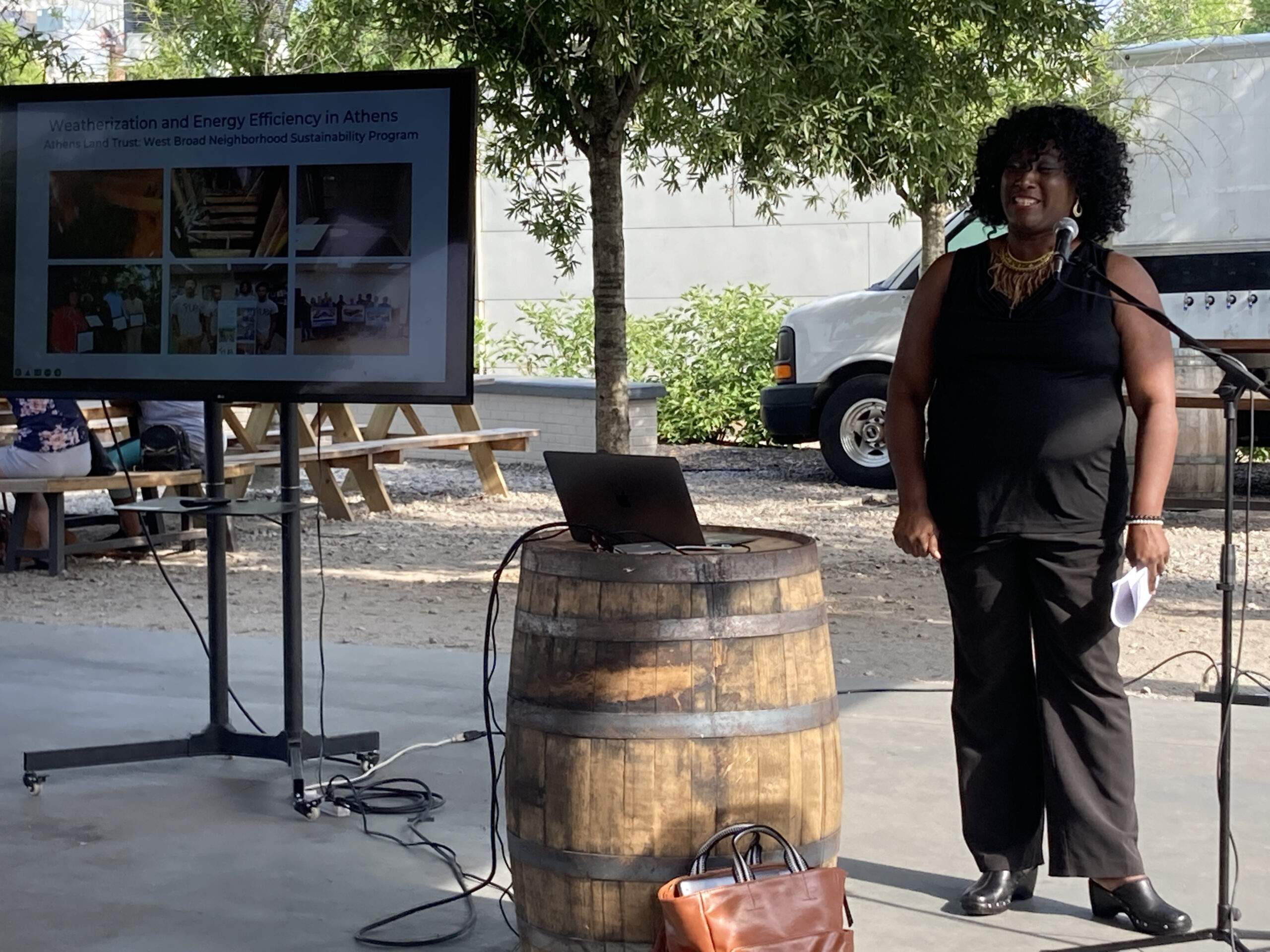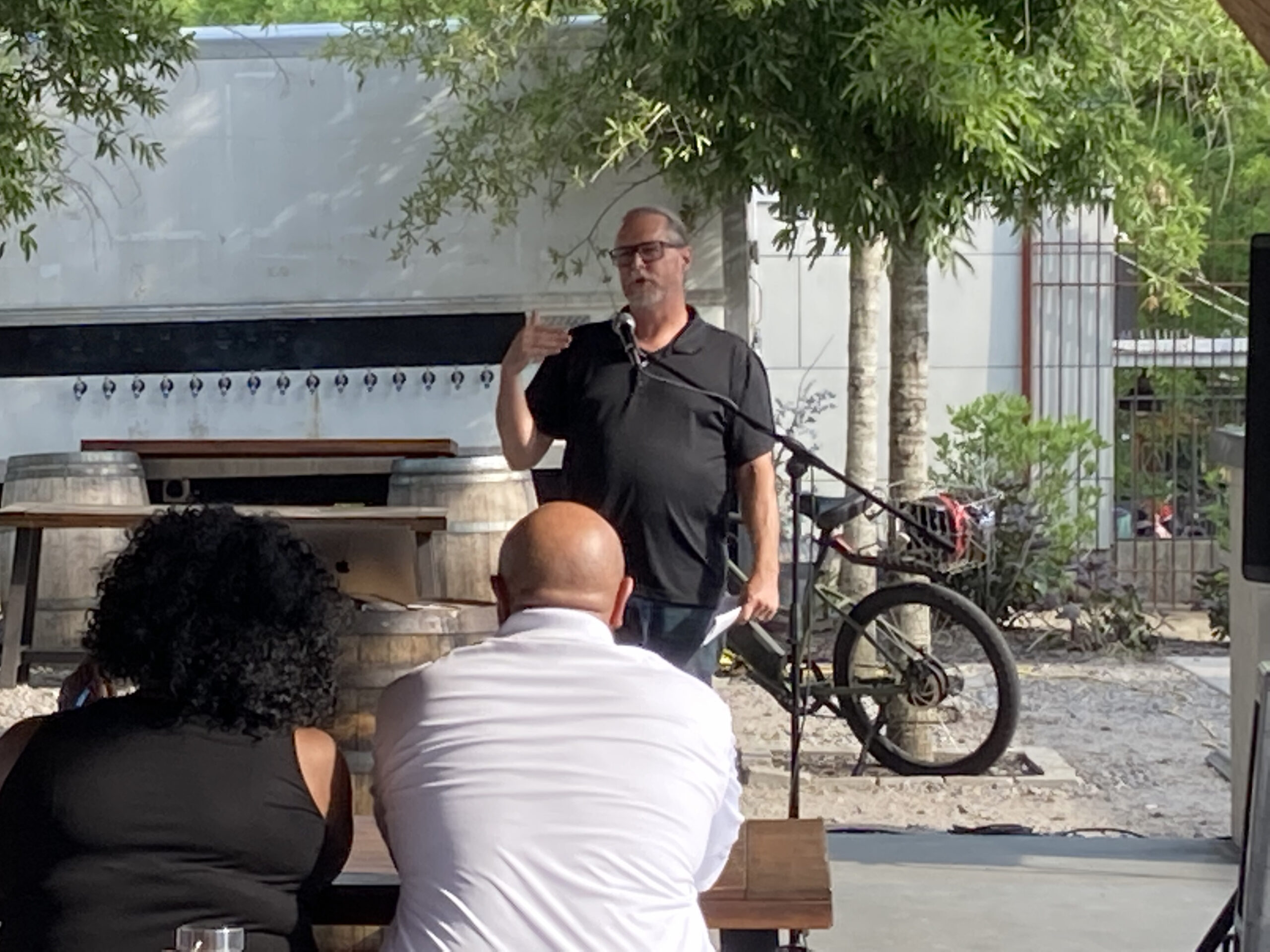Georgia Power, the investor-owned utility that has monopoly status and serves customers in 150 counties in Georgia, is planning for its next two decades of energy use, and Georgia residents are making sure regulators hear their voices. Georgia Power’s 2022 integrated resource plan (IRP) details the utility’s proposed mix of energy fuels, including coal, fossil gas, and renewable sources. SACE is joining environmental and energy justice groups to help Georgians engage with the elected members of the Georgia Public Service Commission, who have the responsibility of ruling on Georgia Power’s plans. Many of these Georgians are seeking MORE investments in clean energy and energy efficiency, STRONGER plans to remediate pollution after power plant closures, and strategies to RELIEVE the burden of unaffordable energy for low-income households.
Residents gathered in Athens on May 19 to discuss Georgia Power’s proposed plan at a community meeting. Creature Comforts Brewery provided space and technical support for the meeting, which was organized by Southern Alliance for Clean Energy and co-hosted by several organizations, including Southface Institute, Athens Land Trust, Environment Georgia, 100% Winterville, the Sierra Club, Sunrise Athens, and Georgia Climate Change Coalition. Local restaurant Rashe’s Cuisine provided dinner for attendees.

Dr. Tawana Mattox Highlights Energy Equity

Dr. Tawana Mattox began the meeting with a discussion about energy equity in Athens. Dr. Mattox established the West Broad Community Advisory Board to work on a sustainability program in the community, and through that work she has begun to learn about how energy justice and climate change impact residents. She explained that while energy issues are new to her and she is still learning, it is important to her to get her group involved in meetings like this and that they are “at the table so that we can begin to articulate what our needs are so that change can happen.” She wants to engage with environmental groups to work “with us, not for us” to make sure that their strengths, needs, and ideas are reflected.
She said that through their work together, she and the community residents have been connecting the dots to learn what energy burden is. They have realized that some of the health and respiratory problems community members face are impacted by energy and climate and where they live–conditions that are determined by redlining and systemic design.
Local Community Efforts Require Cooperation From The Utility

Residents and local officials from neighboring Winterville joined the meeting as well. City councilmember Bruce Johnson shared Winterville’s plans for solar installations on the Winterville Auditorium and the 100% Winterville Initiative that he began prior to being elected to his council seat. He used the project as an example of the importance of cooperation between local governments, state agencies, and utilities to help communities meet their goals.
Environmental Groups Explain What Is In The IRP
Katie Southworth, who joined the meeting from Southface Institute, explained that Georgia Power’s plans in the proposed IRP rely too heavily on investments in new fossil power plants and ignore the potential for reducing demand through energy efficiency. Energy efficiency programs, she said, could be viewed as a local power plant in terms of energy saved.
Strong investments in community programs similar to the West Broad sustainability program could help the utility avoid the need to build more new, costly fossil fuel power plants in future years by decreasing the overall energy demand from residents.
Scott Presson, chapter leader for the Sierra Club in Gwinnett, Georgia, discussed Georgia Power’s strategy for cleaning up coal ash at retired coal plants. He said the company’s plans to cap coal ash plants without lining the ponds are inadequate for protecting Georgia communities from harmful coal ash pollution exposure, which can leach arsenic and mercury into groundwater and cause cancer, heart disease, stroke, and other health problems. The PSC could tell Georgia Power to fully excavate the coal ash and move it to safely lined landfills away from bodies of water for all of their sites.
Questions and Discussion from Community Members
A robust community discussion followed the presentations. Community members asked about solar net metering and discussed their concerns about Georgia Power’s continued use of fossil natural gas, which not only emits carbon dioxide when burned but also releases planet-warming methane gas and other pollutants when extracted and transported.

Are you interested in helping us get the word out to Georgians about the IRP? We would love to join you and your friends, neighbors, or community groups and give a virtual presentation about the IRP. If you are interested in helping us host an online gathering, please use this link to send us your contact information, and we will reach out!